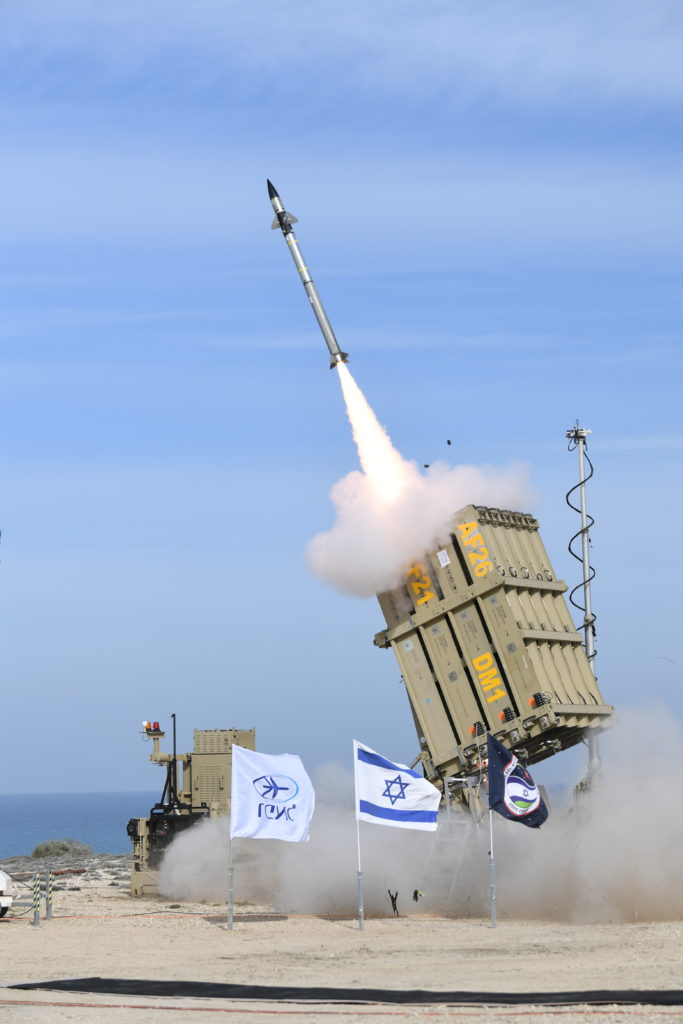
The Hezbollah terror group fired 19 missiles at Israel on Friday, the largest such attack since the 2006 war between them, and warned of future attacks against Israel if conflict resumed. The IDF Twitter feed reported that 10 of the 19 rockets were intercepted by the Iron Dome missile defense system, while six landed in open areas in Israel and the remaining three missiles landed inside Lebanon.
In response, Israel struck back at the rocket launching sites in Lebanon according to another IDF tweet, noting, “We will not let attacks on Israeli civilians go unanswered.”
The incident followed rocket attacks against Israel from Lebanon and IDF counterstrikes on Thursday. According to The Times of Israel, the IDF believed those rockets were launched by Palestinian terrorists in Lebanon, as opposed to the more powerful Hezbollah group. After Friday’s round where Hezbollah itself attacked Israel—which The Times of Israel noted was the worst attack since 2006—leaders of both sides were warning against further conflict.
“Even during the severe economic and political crisis in Lebanon, Iran and Hezbollah are entangling the citizens of Lebanon in a front against Israel,” Israeli Prime Minister Naftali Bennett said in comments released by his office on Sunday. “Lebanon and its army must take responsibility for what is happening in their backyard. In this case as well, it is less important to us if it was a Palestinian organization that was involved, or they were dissidents or independent. The State of Israel will not accept firing at its territory.”
Hezbollah Secretary General Hasan Nasrallah, meanwhile, warned the IDF would be destroyed in a future war with Israel. According to a report by the Hezbollah-affiliated Al-Manar TV, the Hezbollah leader claimed Friday’s rocket attack was a response to Israel’s self-defense counterstrikes on Thursday and was intended as retaliation to reset to the previous rules of engagement where neither side openly attacked the other for years.
While Nasrallah was trying to sound like the aggrieved party—even though it was Israel who was initially attacked by terrorists in Lebanon—the United States’ reaction placed the blame for Friday’s escalation on Hezbollah.
“The United States condemns in the strongest terms Hezbollah’s rocket attacks into Israel,” said spokesperson Ned Price in a statement published by the State Department. “This violence puts Israelis and Lebanese at risk and jeopardizes Lebanon’s stability and sovereignty.”
Since the Israel-Hezbollah war in 2006, the Lebanese military and United Nations peacekeepers are supposed to prevent Hezbollah from attacking Israel. While that goal has clearly been missed, that didn’t stop Israel or the US from reminding the Lebanese military of their responsibility.
“The United States remains engaged with Israeli and Lebanese officials, as well as the Lebanese Armed Forces. We call upon the Lebanese government urgently to prevent such attacks and bring the area under its control,” said Price, who also urged Lebanon’s government to “facilitate full access” for UN peacekeepers.
Said Price, “We strongly encourage all efforts to maintain calm.”
And it isn’t just Israel threatened by Hezbollah, an Iranian proxy backed by Tehran. Israeli Prime Minister’s Office Spokesman Ofir Gendelman posted to Twitter video taken by a Lebanese citizen that he noted “exposes what #Hezbollah did this morning when it fired 19 rockets at Israel from populated areas, right next to people’s homes, in south Lebanon. That’s another war crime perpetrated by Hezbollah. Hezbollah occupies and destroys Lebanon for the Iranian regime.”
Bennett, in his comments on Sunday, said that Lebanese citizens are losing patience with Hezbollah, who in addition to controlling the country by armed force also holds powerful influence in the country’s government.
Said Bennett, “In the Lebanese sector, there has been a very important awakening by many citizens in the country against Hezbollah and the Iranian involvement there.”
As for future conflict, Israel is warning they will defend themselves as needed. In an Israeli press release recap of a call between Israeli Defense Minister Benny Gantz and US Secretary of Defense Lloyd Austin on Friday, Gantz said his country is asking the global community to “demand from the Lebanese government an end to rocket launches at Israel.”
Regardless of what the rest of the world does, the summary paraphrased Gantz as telling Austin that “Israel’s defense establishment is prepared for any scenario, and will continue to operate against Hezbollah or any of its proxies in order to defend Israeli citizens. At the same time, Israel is prepared to provide Lebanon with humanitarian aid through the international community or from Israel territory should it be needed.”
(By Joshua Spurlock, www.themideastupdate.com, August 8, 2021)
